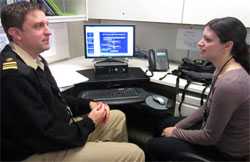Division of Bacterial Diseases (DBD) News Bulletin
This website is archived for historical purposes and is no longer being maintained or updated.
January 4, 2012: Content on this page kept for historical reasons.
In This Issue
A Year in Review
- Quarter 1
- Quarter 2
- Quarter 3
- Quarter 4
- 2012 Events
Winter 2011
Quarter 2
DBD staff conducted an Invasive Bacterial Vaccine-Preventable Diseases (IB-VPD) network training workshop in Manila, Philippines in the spring. DBD serves as the Global Reference Laboratory for this network and has supported the World Health Organization (WHO) regional reference labs to build capacity for detection, isolation and characterization of these organisms. DBD supports countries in several regions to conduct surveillance. See photo below left.

Photo: RDB’s Chad Cox and Ruth Link-Gelles working on the PCV13 missed opportunities analysis.
World Meningitis Day was celebrated on April 24. In addition to highlighting the event through CDC channels, DBD staff participated at the National Meningitis Association’s annual gala in New York City. In late 2011, new meningitis and meningococcal disease websites went live.
In May, a stakeholder meeting was held in Washington, DC to kick-off a public engagement project on meningococcal vaccines. CDC held four community meetings (organized by contractors, FHI360 and The Keystone Center in collaboration with state and local health departments) to give parents, healthcare providers, health plan administrators and public health officials an opportunity to provide input regarding how to use meningococcal vaccines for infants and young children.

Photo: RDB’s Carla Talarico, second from left, works with participants in characterizing pneumococcal isolates in a WHO Western Pacific Regional Laboratory Training Workshop for Invasive Bacterial Vaccine- Preventable Disease (IB-VPD), Manila, Philippines, in April.
In June, ACIP made recommendations that women’s healthcare providers should implement a maternal Tdap vaccination program for unvaccinated women. Healthcare providers should administer Tdap preferably during the third or late second trimester (after 20 weeks gestation). Alternatively, they can administer Tdap immediately postpartum. ACIP also updated recommendations on cocooning and special situations.
In June, ACIP made recommendations for use of MCV4 for certain groups of children 9 through 23 months of age at increased risk for meningococcal disease. This is the first time that MCV4 has been licensed and recommended for children younger than 2 years of age.
DBD staff collaborated with the Division of Reproductive Health to launch an emergency investigation through Active Bacterial Core surveillance (ABCs) into postpartum invasive bacterial cases and possible associations with postpartum intrauterine device (IUD) placement. A new protocol is now moving forward to fully investigate the problem through the Emerging Infections Program sites.
In June, DBD was alerted to PCV13 missed opportunities in which invasive pneumococcal disease cases could have been prevented had older children received the recommended supplemental dose of PCV13. To communicate this important message to clinicians, DBD, in collaboration with ISD, published articles in MMWR and AAP News. See photo above right.
DBD staff attended the WHO annual New and Under-utilized Vaccines Implementation (NUVI) meeting in Montreux, Switzerland in June. Staff provided updates on progress on introduction of new vaccines (meningococcal, Hib and pneumococcal) in countries around the world, especially developing countries, and participated in workshops on surveillance, pneumococcal vaccine schedules, and other topics that aim at facilitating new vaccine introduction.
DBD collaborates on 2 case-control studies of the effectiveness of pneumococcal conjugate vaccine (PCV) in South Africa – the first African country to introduce PCV into its national routine infant immunization program. Both studies are attempting to evaluate effectiveness among HIV-infected and HIV-uninfected children. DBD statisticians and epidemiologists have been involved from the design stage through to recent preliminary analyses, providing direct technical support as well as training and mentoring for South African statisticians and epidemiologists involved in the studies. Interim analyses of the studies were conducted in November and December and submitted to the International Symposium on Pneumococci and Pneumococcal Diseases.
- Page last reviewed: January 4, 2012 (archived document)
- Content source:


 ShareCompartir
ShareCompartir
